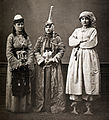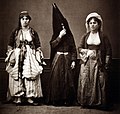Tantour: Difference between revisions
Appearance
Content deleted Content added
Yoshiman6464 (talk | contribs) →Gallery: Replaced with higher-quality image |
|||
| (38 intermediate revisions by 26 users not shown) | |||
| Line 1: | Line 1: | ||
{{Short description|Levantine cone-shaped woman's headdress}} |
|||
| ⚫ | |||
| ⚫ | |||
| ⚫ | |||
| ⚫ | The '''tantour''' (tantoor) |
||
| ⚫ | The '''tantour''' (''tantoor'') is a form of cone-shaped women's headdress similar to the [[hennin]], popular in the [[Levant]] during the nineteenth century, but seldom seen after 1850 outside of use as a [[folk costume]].<ref>{{Citation | url = http://almashriq.hiof.no/general/600.technology/640/646/costumes_of_the_Levant/19th.html | contribution = 19th Century Lebanese Princess |title= Almashriq | publisher= Hiof | place = NO}}</ref><ref>{{cite web|url= http://www.trmkt.com/tantour.htm |title= The Tantour or Shihabbiyeen |publisher= TRMKT | access-date= 2010-08-16}}</ref> |
||
The tradition persisted longer in Lebanon among the [[Druze]], as evidenced by the 1870s photograph to the right. |
|||
| ⚫ | The tantour was a customary gift presented to the bride by her husband on their wedding day.<ref>{{cite web|url=http://almashriq.hiof.no/general/600/640/646/costumes_of_the_Levant/origin.html|archive-url=https://web.archive.org/web/20100224115446/http://almashriq.hiof.no/general/600/640/646/costumes_of_the_Levant/origin.html|archive-date=2010-02-24|website=Almashriq|title=Origin of Levantine Costumes|publisher=Hiof|access-date=2010-08-16}}</ref> |
||
The tantour was held in place by a ribbons tied around the head. A silk scarf was wound around the base with a white veil attached to the peak. The height and composition of the tantour were proportional to the wealth of its owner, with the most splendid tantours made of gold and reaching as high as thirty inches. Some were encrusted with gems and pearls. |
|||
==Gallery== |
|||
| ⚫ | |||
<gallery> |
|||
File:Damascusfashion.jpg|Damascus fashion, illustration from the book ''Popular Costumes in Turkey,'' 1873 |
|||
File:Zahlefashion.jpg|Lebanese fashion, illustration from the book ''Popular Costumes in Turkey,'' 1873 |
|||
| ⚫ | |||
| ⚫ | |||
</gallery> |
|||
==See also== |
==See also== |
||
| ⚫ | |||
| ⚫ | |||
*[[ |
*[[Kokoshnik]] |
||
*[[Ochipok]] |
|||
*[[Labbadeh]], traditional Lebanese men's headdress |
|||
*[[Pointed hat]] |
*[[Pointed hat]] |
||
| ⚫ | |||
*[[Kokoshnik]] |
|||
*[[List of hats and headgear]] |
*[[List of hats and headgear]] |
||
| Line 20: | Line 25: | ||
{{reflist}} |
{{reflist}} |
||
{{Hats}} |
|||
[[Category:19th-century fashion]] |
|||
[[Category:Headgear]] |
[[Category:Headgear]] |
||
[[Category:Hats]] |
[[Category:Hats]] |
||
[[Category:Arabic clothing]] |
[[Category:Arabic clothing]] |
||
[[Category:Middle Eastern clothing]] |
[[Category:Middle Eastern clothing]] |
||
[[Category:Ottoman |
[[Category:Clothing of the Ottoman Empire]] |
||
[[Category:Lebanese |
[[Category:Lebanese fashion]] |
||
[[Category:Druze culture]] |
|||
[[Category:Women's clothing]] |
|||
{{clothing-stub}} |
{{clothing-stub}} |
||
[[he:טנטור (כובע)]] |
|||
Latest revision as of 04:53, 28 December 2024
| Part of a series on |
| Arabic culture |
|---|
 |
The tantour (tantoor) is a form of cone-shaped women's headdress similar to the hennin, popular in the Levant during the nineteenth century, but seldom seen after 1850 outside of use as a folk costume.[1][2]
The tantour was a customary gift presented to the bride by her husband on their wedding day.[3]
Gallery
[edit]-
Damascus fashion, illustration from the book Popular Costumes in Turkey, 1873
-
Lebanese fashion, illustration from the book Popular Costumes in Turkey, 1873
-
Recreated costume of a Lebanese princess from the nineteenth century, including a tantour
See also
[edit]- Hennin
- Kokoshnik
- Ochipok
- Labbadeh, traditional Lebanese men's headdress
- Pointed hat
- List of hats and headgear
References
[edit]- ^ "19th Century Lebanese Princess", Almashriq, NO: Hiof
- ^ "The Tantour or Shihabbiyeen". TRMKT. Retrieved 2010-08-16.
- ^ "Origin of Levantine Costumes". Almashriq. Hiof. Archived from the original on 2010-02-24. Retrieved 2010-08-16.




